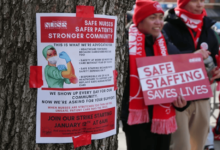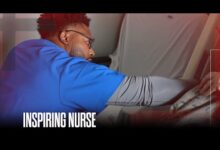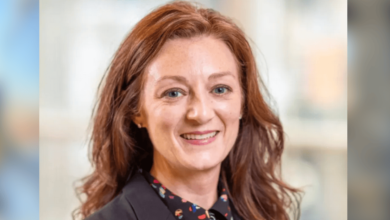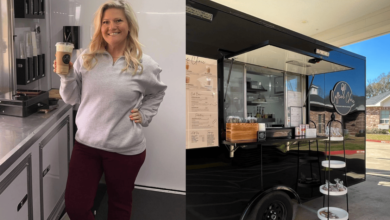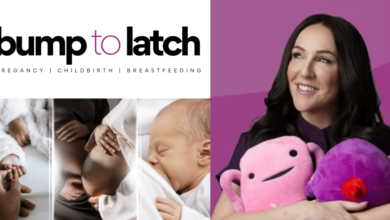Nurses will get chance to inform new 10-year plan for healthcare

The chief nursing officer (CNO) for England has urged all nurses and midwives to take up the opportunity to inform the development of the government’s new 10-year plan for healthcare.
Duncan Burton revealed that a “comprehensive engagement exercise” would soon be launched that will give health professionals, patients and the public the chance to contribute their views on what the plan should look like.
“We’ve got a vast array of good practice already, and that should be the starting point for the plan”
Duncan Burton
The work on the 10-year transformation plan for health and care began with Lord Ara Darzi’s independent review of the NHS in England, published last month.
After the publication, the government confirmed that the new plan would focus on achieving three major shifts: moving more care into the community, stepping up digital transformation of the health service and preventing people from getting ill in the first place.
Speaking today at the Queen Nursing Institute (QNI)’s 2024 online conference on community nursing, Mr Burton said: “My call to action to all of the colleagues on this call and for nurses and midwives everywhere, is that you are key to the development of the plan and its delivery.
“There is a real commitment to engage people from across our professions and importantly, the people and the communities that we serve.
“So, the team leading the development of the plan will be undertaking a comprehensive engagement exercise with staff, with patients and the public, and I urge everyone to please get involved.”

Duncan Burton talking at the QNI conference
Specifically addressing the community nursing staff and leaders at the QNI event, Mr Burton added: “We need you to be championing the role of community and primary care nursing.
“As Lord Darzi points out in his report, many of the solutions to the challenges can be found in parts of the NHS today.
“What I know from going out and visiting colleagues across England and hearing about all the fantastic work: we’ve got a vast array of good practice already, and that should be the starting point for the plan.”
Mr Burton was speaking in a session alongside interim Scotland CNO Anne Armstrong and representatives from the CNO offices in Northern Ireland and Wales.
During a question-and-answer session, they were all asked for their views on the government’s statement – made after Lord Darzi’s report – that the NHS was “broken but not beaten”, and what they thought nurses’ role was in improving services.
Ms Armstrong said: “I wouldn’t say that the health service has failed. I think there are pressures in the system: you’ve got an ageing population with much more complex needs, and we’ve got a backlog from Covid.

Anne Armstrong
“So, I think that it’s a hugely complex area in which we’re working.
“However, I think nurses have a key role to play in this, and it’s ensuring that we’re delivering those modern services, embracing digital and [artificial intelligence] where required, and have the skills and competence and confidence to deliver those services in different ways.”
She cited the importance of services being reformed in an integrated way across health and social care and said the voices of nurses needed to be “central” in shaping the future direction of travel.
Similarly, Paul Labourne, a nursing officer in the Welsh Government working alongside CNO Sue Tranka, disagreed with the characterisation of the NHS being “broken” but he accepted that it was “bruised”.
“We have just been through the pandemic,” he noted.
Going forward, Mr Labourne said nurses would have an “immense role” in helping to rebuild not just health services but society as a whole in the wake of Covid-19.
He said it was key that the “promotive and preventative” role that nurses can and do play in healthcare was recognised and supported.

Paul Labourne
“I think we need to take some territory back. I think we need to not be seen as people who undertake tasks,” he told the QNI conference.
“I think the nursing activities that we undertake are promotive and preventative, and people don’t recognise that.”
He added that nursing was “definitely part of the future and not part of the past”.
Sonia Glendinning, public health nursing officer in the Northern Ireland Department of Health, who was there in the stead of CNO Maria McIlgorm, was also of the opinion that the NHS was not broken.
However, she added that “certainly we’re trying to work under extremely difficult financial budgets… across all the four nations”.
Like Mr Labourne, Ms Glendinning highlighted the preventative role that nurses, midwives and health visitors played which would be key in transforming services in the way envisioned.

Sonia Glendinning
She said that it would be important that pre- and post-registration nursing education programmes had an “emphasis on public health” and keeping people out of hospital.
She further highlighted how nurses were in a good position to take the health service forward as it was consistently ranked one of the most trusted professions.
“If we’re the most trusted profession, we must actually be part of that solution and fixing some of the myths and some of the perceptions that are out there,” said Ms Glendinning.
Lastly, England CNO Mr Burton stressed the “not beaten” part of the government’s statement and the recognition in the Darzi report of “the fantastic work that colleagues do every single day”.
He noted that nurses and midwives represented 1% of the whole population: “That is a significant, powerful force for change across all of our communities.”
The CNO urged nurses to “lean into” areas like technology, artificial intelligence, genomics and the sustainability agenda in the future.
“We’ve got to really make sure, as professionals, we’re learning about those things, we’re educating and we are at the leading part of them because nurses are absolutely core to the solution,” added Mr Burton.
“Because we are there 24/7 with our patients, with our local populations, and helping to support those when they need us the most. But also, and increasingly, preventing ill health as well.”
He reiterated his appeal for nurses and midwives to take part in the upcoming engagement work for the 10-year plan and “share the great practice that’s going on”.
More on the Darzi report


